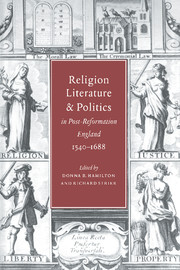Book contents
- Frontmatter
- Contents
- List of contributors
- Introduction
- 1 Sir John Oldcastle as symbol of Reformation historiography
- 2 The “sacred hunger of ambitious minds”: Spenser's savage religion
- 3 Subversive fathers and suffering subjects: Shakespeare and Christianity
- 4 Kneeling and the body politic
- 5 Donne and the politics of devotion
- 6 Catholic, Anglican or puritan? Edward Sackville, fourth Earl of Dorset, and the ambiguities of religion in early Stuart England
- 7 Crucifixion or apocalypse? Refiguring the Eikon Basilike
- 8 Marvell, sacrilege, and Protestant historiography: contextualizing “Upon Appleton House”
- 9 Entering The Temple: women, reading, and devotion in seventeenth-century England
- 10 Contextualizing Dryden's Absalom: William Lawrence, the laws of marriage, and the case for King Monmouth
- 11 Reformation in the Restoration Crisis, 1679–1682
- 12 Shadwell's dramatic trimming
- Index
11 - Reformation in the Restoration Crisis, 1679–1682
Published online by Cambridge University Press: 16 October 2009
- Frontmatter
- Contents
- List of contributors
- Introduction
- 1 Sir John Oldcastle as symbol of Reformation historiography
- 2 The “sacred hunger of ambitious minds”: Spenser's savage religion
- 3 Subversive fathers and suffering subjects: Shakespeare and Christianity
- 4 Kneeling and the body politic
- 5 Donne and the politics of devotion
- 6 Catholic, Anglican or puritan? Edward Sackville, fourth Earl of Dorset, and the ambiguities of religion in early Stuart England
- 7 Crucifixion or apocalypse? Refiguring the Eikon Basilike
- 8 Marvell, sacrilege, and Protestant historiography: contextualizing “Upon Appleton House”
- 9 Entering The Temple: women, reading, and devotion in seventeenth-century England
- 10 Contextualizing Dryden's Absalom: William Lawrence, the laws of marriage, and the case for King Monmouth
- 11 Reformation in the Restoration Crisis, 1679–1682
- 12 Shadwell's dramatic trimming
- Index
Summary
The Restoration Crisis was a crisis about reformation. In early 1679, Sir Robert Southwell recorded his perception that “there is now spread an universal demand of reformation.” Others who recorded their perceptions about the crisis of 1679–82 also believed it was a crisis about religion, a label that has recently been more strongly associated with 1640–2. Richard Baxter, for instance, beheld in 1679 a nation “distracted by Divisions; and much, if not most about Religion, … Teachers against Teachers, in Discourses, Sermons, Books, rendring each other despicable.” Or, as Bishop Gilbert Burnet lamented two years later: “To what has a contest that began at first about hood and Surplices risen amongst us?” Writing in retrospect, the Anglican controversialist Edmund Bohun complained about “how the Dissenters took the occasion of the Plot, and of the general hatred against Popery to ruine the Loyal and conformable clergy.” They had, he charged, “engrossed the Title of Protestant.”
The concept of reformation is a familiar one to students of Stuart history and literature, and those who have recently written about the Restoration have stressed the importance of religion in political debate. Nevertheless, the scholarship about this crisis continues to be preoccupied with political and constitutional issues and ideology, even as the climactic crisis of Charles II's reign receives a remarkable facelift.
- Type
- Chapter
- Information
- Publisher: Cambridge University PressPrint publication year: 1996
- 5
- Cited by

